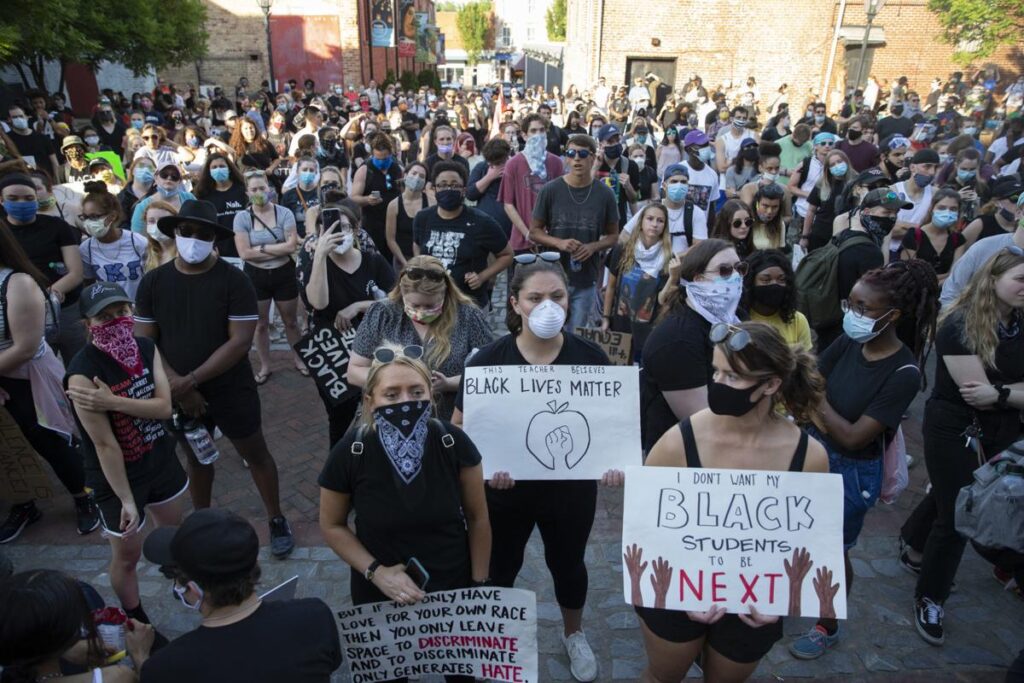UMW alum helps lead Fredericksburg Black Lives Matter protests
4 min read
Fredericksburg Black Lives Matter Protests have continued into June (Mike Morones | The Free-Lance Star)
By COSMY PELLIES
Associate Editor
New movements give rise to new leaders. As Black Lives Matter protests persist across the entire country, former and current UMW students have become a part of the efforts. After a display of force against protesters by the Fredericksburg and UMW police on Sunday, May 31, one UMW alumnus stepped up to lead the forces.
Cam Coates, who graduated this past spring with a communication and digital studies major, did not enter into the protests thinking that he would assume a leadership role. Rather, he “rose to the occasion.”
“It’s crazy because I didn’t get involved until Sunday, May 31, which was when people first got tear gassed,” he said. He was coming home from his job at Benny’s when he stopped to observe the conflict, and he said he was tear gassed just “for being on the sidewalk.”
Attending protests after this incident, Coates found himself on the front lines sharing inspirational words and leading chants.
“I felt like it was important for me to lead because a lot of people are scared and want their voices heard.”
He joined The Melanin Cooperative, which was one of the many activist groups involved in the Fredericksburg protests. Coates describes The Melanin Cooperative as the “street team” of all the groups, because they organize most of the marches.
Coates witnessed several disturbing scenes while on the front lines of the protests. To him, the most horrible sight was “seeing victims of brutality choking, having asthma attacks or allergic reactions to the chemicals and teargas.”
The overall terror that protesters experienced while being hit with teargas and rubber bullets was also hard for him to watch. He remarked, “I saw kids out there… there was a nine year old kid out there.”
Coates also experienced moments of inspiration during the protests, due to the sense of community that the protestors and leaders fostered in such a short time.
“We just met each other through this and now we’re a giant family.” Coates also found himself “inspired by the other leaders.”
In the wake of these protests, the City of Fredericksburg has enacted some change, including the removal of the slave auction block located on the corner of William Street and Charles Street. Coates sees this change as a big step, as citizens of Fredericksburg have been pushing for the removal since 2017. Coates approves of the block’s removal, and adds that “it’s important, but unfortunately, knowing the nature of politics, it is kind of performative.”
Coates said that he and the citizens of Fredericksburg want to see more systematic change.
For Coates, the protests, while necessary, are not the only way to enact change.
“We don’t just march,” Coates says.
He and other leaders sign petitions daily and conducted a mental health awareness and voter registration event in Hurkamp Park. They plan to organize other events in Fredericksburg to spread awareness and education about the Black Lives Matter movement and other related topics and also to open a dialogue with others.
Along with the efforts of Coates and other leaders in the area, an organization called Fredericksburg Power Collective wrote a detailed list of demands for Fredericksburg government officials.
The first demand calls for the curfew to be lifted; this has been granted. Some of the demands pertain to the suspension of funds used to militarize police and allocate them to other areas of the Fredericksburg community, and some aim to “reduce the rate of which police are deployed as first responders to scenes.”
Other demands detail ways to “proactively reconfigure Fredericksburg City Public Schools’ role in the school-to-prison pipeline” and to incorporate antiracist practices in the school system. The last section addresses the need to create a conversation about Fredericksburg’s history and make a plan for reparations; this includes an idea for “a scholarship in honor of enslaved people.” Coates and others have worked hard to broadcast these demands over social media and other outlets.
These demands reached government representatives. Coates, along with other leaders of the movement, attended a meeting with the mayor of Fredericksburg on Tuesday, June 16.
“We were discussing how there were [more than] 50 people charged for being out past curfew.”
According to a representative from Fredericksburg Police Department, this is counted as a first class misdemeanor, which can result in up to a year in jail.
“We were asking for a clean slate, like expunging the charges.”
Organizers also asked for accountability and an apology from police for the use of less-lethal weapons on peaceful protestors.
Coates believes that both protests and other avenues of activism are important to the cause.
“Be aware that you are putting yourself in danger, but also that’s somewhat the point because that’s what we’re fighting, police brutality,” he advises protesters. “Trust in your community of protesters and be vigilant.”
Coates believes the protests will continue for some time, as there is a call for more change than what has already occurred.
“We’re looking for reform in the most streamlined way possible.” Until that reform is enacted, protesters will look to leaders like Coates who empower them to join the fight for change.


